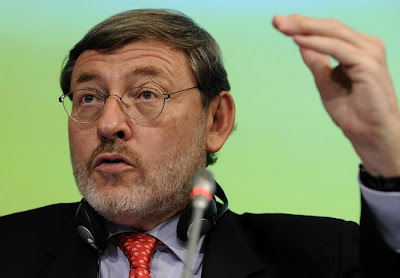Cycling imposes enormous demands from a physical point of view. It’s necessary to have a serious review in to the length of the grand tours.
So says Spanish sports minister Jaime Lissavetzky, who also sits on the executive committee of WADA, in an interview with Marca. The underlying idea here is that the duration and demands encourage doping. It’s an interesting point of view and worth exploring. Lissavetzky also says other things and by and large, he comes across as sensible.
Why Lissavetzky is right
A grand tour is four Sundays with almost every day in between spent in competition, from four to seven hours a day. The itinerant nature of a race means that on top of the race mileage, more time is taken up in travel between hotels. Rest is hard.
There’s also the documented physical effects. Tests have shown riders experience falling hormone levels and other important things like the haematocrit normally fall substantially. A rider certainly finishes the race depleted.
Such declines in physical parameters might encourage some to top-up their levels with doping products. A rider who resorts to doping can gain a significant advantage.
Why Lissavetzky is wrong
Duration of an event isn’t correlated with doping. Athletics shows us how many 100m sprinters have been caught. Instead it is the money and prestige at stake that encourages some to win.
Sport is a “winner takes all” environment where the first over the line stands to collect massive rewards. Combined with low odds of detection, this is perhaps the main driver of doping. More money means more incentives to win, at all costs.
The whole point of a long event is to determine a winner in a majestic sense. A grand tour rewards a rider with powers of recovery and stamina. That’s often why we say a time trial in the final days of a race rewards fresh riders and not always the specialists.
Indeed any keen cyclist who trains and lives well should be capable of three weeks of racing. Clearly the speed will vary according to talent and training and some will, as with some riders in the Tour, suffer injury and illness. But it’s not inhuman, something reserved for desperate “convicts of the road”.
Conclusion
Cycling is a relentlessly commercial sport. I can’t imagine my race organisers and indeed team sponsors wanting less exposure, fewer hours of TV coverage. Add on the shear size of France, Italy and Spain – you can’t two these places in two weeks and I can’t see races being shortened.
I don’t think the length in itself causes doping. Nevertheless race organisers could ensure races don’t become too depleting. Are stages over 200km in the final week necessary, they add to fatigue yet most of the action happens in the final 30km of a stage, if not the final 10km. 180km is plenty for a mountain stage in the final week. Also, a hidden element is transfers, fans might turn off their TVs at 5pm but riders have plenty of work left. Travel, washing, media appearances, massage and eating often means sleep comes late.
So in summary economic imperatives probably block shortening the Giro and Tour… but perhaps Mr Lissavetzky would like to try an experiment in his backyard of Spain? Meanwhile I’d look at capping the distances in the final week of a grand tour. Plus organisers need to think about excessive transfers.


Early editions of the Tour were even longer than they are now (http://bikeraceinfo.com/tdf/tdfstats.html). I would guess that some of the things you mentioned–transfers, massage, media, etc–were missing in those early days. But we're talking several thousand kilometers more in some cases(1920's). And on heavier, fewer geared, less-efficient bikes. As you can see from the chart as well the average speed has gone up significantly as well, but several factors like technology, better roads, better training make up for that, along with shorter distances.
Given this info, I just don't buy into the Tour as being too hard or too long.
Looking at that chart I posted some more, I can see that in those old days that percentage wise there were far fewer finishers, which although could make for great racing, would not necessarily make sponsors happy. And noticeably since the 60's (advent of television?) the finishing rate has been higher (1998 being the obvious exception).
Gillis I think they had a lot of stimulant use in earlier Tours also and there were no doping controls.
I think we have a modern era now and need to see the race reflected by this. At first the Tour de France was an epic test of endurance, today is more about the "mano a mano" battles on TV.
While I agree that it is prestige that drives the urge to dope, it is not just the winners that should be considered. Doping is also highly prevalent amongst the domestiques who probably feel the need to dope just to do their job and ensure their livelihood for another year. Reducing the demands of the events may offer some benefit to this type of rider.
i am very upset with this atti`tude 🙂